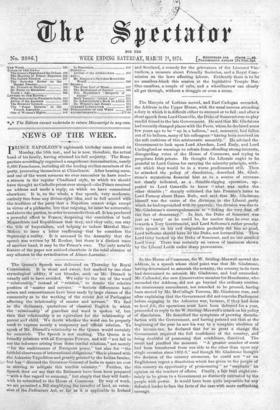lathe House _of Commons, Sir W. Stirling-Maxwell moved the address,
in a speech whose chief point was that Mr. Gladstone, having determined to astonish the country, the country in its turn had determined to astonish Mr. Gladstone, and had' succeeded. Mr. Callendei, the new Conservative member for Manchester, who seconded the Address, did not go beyond the ordinary routine. An unnecessary amendment, not intended to be pressed, having been moved by Mr. McCullagh Torrens, Mr. Gladstone rose, and after explaining that the Government did not convoke Parliament before engaging in the Ashantee war, because, if they had done so bond fide, the operations must have been deferred for a year, proceeded to reply to Sir W. Stirling-Maxwell's attack on his policy of dissolution. He described the symptoms of growing dissatis- faction with the Government, and having pointed out that at the beginning of the year he saw his way to a complete abolition of the income-tax, he declared that for se great a change the Government required the full confidence of the country, and being doubtful of possessing that confidence? dissolved. The result had justified the measure. "A greater number of seats had been transferred from one side to the other than upon any single occasion since 1832-3," and though Mr. Gladstone thought the decision 'of the country erroneous, he could not "as an Englishman regret a dissolution which has given to the people of this country an opportunity of pronouncing " so ' emphatic' an opinion on the conduct of affairs. Finally, a fair trial ought cer- tainly to be given to a Government so distinctly entrusted by the people with power. It would have been quite impossible for any defeated leader to face the facts of the case with more unflinching courage.






































